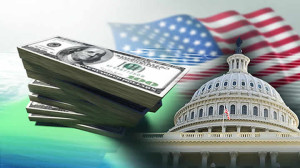House Proposes Fiscal Cliff Counteroffer
 Washington- A ‘Fiscal Cliff’ showdown erupts in Congress on Monday, when a Republican $2.2 trillion budget deficit reduction proposal involved cutting back on federal taxes that the Democrats have been trying to raise.
Washington- A ‘Fiscal Cliff’ showdown erupts in Congress on Monday, when a Republican $2.2 trillion budget deficit reduction proposal involved cutting back on federal taxes that the Democrats have been trying to raise.
The ‘Fiscal Cliff’ will transpire by the end of 2012 and early 2013 when the Budget Control Act of 2011 is set to take effect. Democrats and the Obama administration seek to raise federal tax revenues to $1.6 trillion in 10 years by terminating existing federal tax cuts and increasing federal tax rates- especially the higher income tax brackets of the wealthy.
This proposal is countered with the Republican representatives’ own proposal that plan to raise $800 billion of federal tax revenues not by increasing tax rates but by limiting income tax deductions and cutting down federal tax rates instead. The Republican counteroffer also aims to cut down federal spending by $1.2 trillion in the next 10 years.
The White House calls this counteroffer unbalanced and that it “sticks the middle class with the bill.” A statement from the White House says that the president asks the wealthiest to pay the highest federal taxes because he is unwilling “to compromise on the principles of fairness and balance.”
Meanwhile, several federal tax experts and statesmen have already taken sides on the brewing debate. Senate Minority Leader Mitch McConnell, for instance, believes that the new Republican offer strives to provide a “realistic approach” in solving the country’s economic problems. However, a lot of groups still want a more specific GOP from both parties.
Categories: Federal Tax Tags: federal income tax, federal tax, fiscal cliff, income tax, Republican Tax, tax code, tax reform
Federal Tax Planning for the “Fiscal Cliff”
 The American stock market has been going down for several days now since the sprouting of fiscal cliff debates after the election. Proponents argue that, along with less government and federal tax spending, the fiscal cliff will help cut down federal budget deficits by the end of 2012 and early 2013.
The American stock market has been going down for several days now since the sprouting of fiscal cliff debates after the election. Proponents argue that, along with less government and federal tax spending, the fiscal cliff will help cut down federal budget deficits by the end of 2012 and early 2013.
However, many critics warn that the expiration of federal tax cuts and the introduction of new federal taxes in 2013 will cause another economic recession in the future.
If the fiscal cliff takes effect, US taxpayers will witness a rise in the federal taxes. For instance, the top federal tax bracket for income will rise from 35 percent to 39.6 percent, while top capital gain rates will rise to 20 percent from the present 15 percent. The federal tax for employee payroll goes back to 6.2 percent as soon as the payroll tax holiday expires by the end of December and dividends will now be taxed as ordinary income. Moreover, estates worth over $1 million will be taxed at 55 percent from the present 35 percent.
With the impending federal tax increases at the turn of the year, there are several federal tax planning strategies to help tax payers cope with the possible federal tax rate changes after the implementation of the fiscal cliff. Investors and taxpayers are advised to take advantage of the federal tax programs before they expire, convert to Roth IRA, invest in municipal bonds, and sell appreciated assets in 2012 in order to avoid federal tax rate gains and Medicare surtax in 2013.
Categories: Federal Tax Tags: federal income tax, federal tax, fiscal cliff, income tax, tax increase, tax law, tax reform
Grover warns of tea party resurrection; Mitchell: ‘fiscal cliff’ not the problem
 With less than one month before the ‘fiscal cliff,’ both White House and Republican parties display an unrelenting tone and are still unable to come up with an agreement that will help avert the effects of the brewing storm of automatic spending cuts and higher federal tax rates by 2013.
With less than one month before the ‘fiscal cliff,’ both White House and Republican parties display an unrelenting tone and are still unable to come up with an agreement that will help avert the effects of the brewing storm of automatic spending cuts and higher federal tax rates by 2013.
Negotiations have been made, but so far no common ground has been reached. President Obama and his Democrat allies have earlier proposed a $1.6 trillion fiscal cliff proposal that presses mainly for higher federal tax rates for the wealthy, which is promptly countered by the $2.2 billion Republican plan that centers on curbing federal tax spending instead of levying higher federal taxes.
In NBC’s “Meet the Press,” Grover Norquist- author of the no-new-taxes pledge and one of the main influences in the GOP debates- warned of a tea party revival if Pres. Obama “pushes the country over the fiscal cliff.”
The fiscal cliff has serious implications: the expiration of the Bush federal tax cuts will raise the current federal tax rates; the expiration of Payroll Tax Cut will raise the rate to up to 2 percent; the commencement of the Budget Control Act will automatically cut back federal tax spending; and the implementation of the Affordable Care Act will result to additional federal taxes.
However, Cato Institute fellow Daniel Mitchell argues that the problem is not the fiscal cliff. “In a competitive global economy, for instance, it is bizarrely self-destructive to increase the double taxation of dividends and capital gains,” writes Mitchell.
Categories: Federal Tax, Income Tax, Tax Law Tags: federal income tax, federal tax, fiscal cliff, grover norquist, republican, tax code, tax pledge, tax reform

